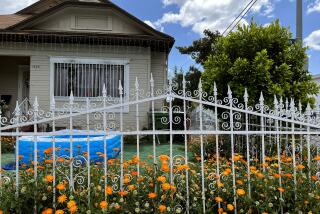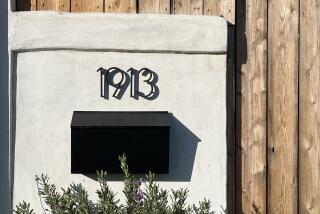Where to hear ‘Hi, neighbor!’: in the suburbs
- Share via
Still no word on whether a stitch in time really does save nine, but a UC Irvine professor has uncovered evidence to support another famous proverb, “Good fences make good neighbors.”
In a study of 15,000 Americans, economist Jan Brueckner found that suburban living is better for people’s social life than city dwelling.
The less crowded a neighborhood is, the friendlier its residents become, the report says.
For every 10% drop in population density, the likelihood of people talking to their neighbors once a week goes up 10%, regardless of race, income, education, marital status or age.
Involvement in hobby-oriented clubs also soars as population density falls, the study found.
Such behavior contradicts a widespread criticism that suburban sprawl causes social isolation and anonymity.
“Our findings suggest the old proverb may be true: ‘Good fences make good neighbors,’ ” Brueckner said.
The professor, who co-wrote the study with Ann Largey of Dublin City University in Ireland, offered several theories on why city slickers don’t mingle as much as their suburban counterparts.
In crowded environments, “people are in your face all the time and you kind of want some privacy.”
Fear of crime can exacerbate wariness, he said.
Another possible factor: The abundance of museums, theaters and other entertainment options in urban areas means “you don’t have to reach out to others to entertain yourself,” he said.
The idea that generous amounts of personal space and boundaries help people get along has been under assault for years.
In 1914, poet Robert Frost took a swipe at the “good fences, good neighbors” theory in “Mending Wall.”
“Before I built a wall I’d ask to know
What I was walling in or walling out ...”
More recently, author Robert Putnam’s “Bowling Alone” and a chorus of sprawl critics have argued that the steady creep of cookie-cutter housing gobbles open space, thickens traffic congestion and damages the nation’s social fabric.
Brueckner said complaints about traffic and open space might be valid, but fears of antisocial behavior “shouldn’t be on the list.”
Sprawl historian Robert Bruegmann, a professor of art, architecture and urban planning at the University of Illinois in Chicago, called Brueckner’s study a welcome antidote to “the endless drumroll of criticism of suburbs,” although he cautioned that he hadn’t read the report and couldn’t vouch for its reliability. Bruegmann noted that the same complaints made about suburban life today -- increased alienation and anonymity -- were leveled at downtown areas 50 years ago.
*
More to Read
Sign up for Essential California
The most important California stories and recommendations in your inbox every morning.
You may occasionally receive promotional content from the Los Angeles Times.













